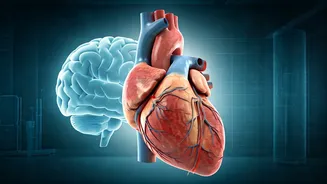Heart: The Overworked Organ
Hypertension places an enormous strain on the heart, forcing it to work harder to circulate blood throughout the body. Over time, this increased workload
can lead to several severe complications. The heart muscle may thicken, a condition known as left ventricular hypertrophy, making it less efficient at pumping blood. This can lead to heart failure, a condition where the heart struggles to meet the body's needs. Furthermore, hypertension significantly elevates the risk of coronary artery disease, where arteries become narrowed due to plaque buildup. This narrowing reduces blood flow, potentially causing chest pain (angina) or a heart attack. Moreover, hypertension contributes to other cardiovascular problems such as arrhythmias (irregular heartbeats) and increases the likelihood of sudden cardiac arrest. Effective management of hypertension is crucial to protect the heart and reduce these life-threatening risks, which includes medication, lifestyle adjustments, and regular health check-ups.
Brain: The Silent Damage
The brain is highly susceptible to the effects of hypertension. High blood pressure can damage the blood vessels in the brain, leading to a variety of neurological issues. One of the most severe consequences is stroke, which occurs when blood supply to the brain is interrupted, causing brain cells to die. Strokes can result in significant disability, including paralysis, speech difficulties, and cognitive impairment. Even without a full-blown stroke, hypertension can lead to vascular dementia, a form of dementia caused by reduced blood flow to the brain. This can result in memory loss, confusion, and impaired judgment. Beyond these major issues, hypertension can also contribute to cognitive decline and impact overall brain function, making it difficult to concentrate or make decisions. Controlling blood pressure is crucial to preserve brain health and minimize the risk of these devastating neurological outcomes. Early detection and treatment of hypertension can make a big difference in safeguarding cognitive abilities and overall quality of life.
Kidneys: Filtration Failure
The kidneys, responsible for filtering waste and maintaining fluid balance, are profoundly affected by hypertension. High blood pressure damages the delicate blood vessels within the kidneys, impairing their ability to function effectively. Over time, this damage can lead to chronic kidney disease (CKD), a condition where the kidneys gradually lose their filtering capacity. CKD can progress to kidney failure, requiring dialysis or a kidney transplant to sustain life. Hypertension is a leading cause of kidney disease, and the risk increases with poorly managed blood pressure. Furthermore, kidney damage caused by hypertension can exacerbate high blood pressure, creating a vicious cycle. The kidneys also play a crucial role in regulating blood pressure by controlling the balance of fluids and electrolytes. When the kidneys are damaged, they may not be able to do this effectively, worsening hypertension. Monitoring kidney function and controlling blood pressure through medication, dietary changes, and regular check-ups is essential to protect kidney health and prevent kidney failure.
Overall Health: Systemic Impact
The effects of hypertension extend beyond specific organs, impacting overall health and well-being. Uncontrolled high blood pressure increases the risk of various health problems. Hypertension contributes to the development of metabolic syndrome, a cluster of conditions including high blood pressure, high blood sugar, unhealthy cholesterol levels, and excess abdominal fat, all of which raise the risk of heart disease, stroke, and diabetes. Additionally, hypertension can affect vision, potentially causing damage to the blood vessels in the eyes, leading to blurred vision or even blindness. It also affects the peripheral arteries in the legs and arms, leading to peripheral artery disease, which causes pain, numbness, and poor circulation in the extremities. Managing hypertension, therefore, requires a holistic approach that considers diet, exercise, stress management, and medication if prescribed by a doctor. Regular monitoring of blood pressure, prompt medical attention, and lifestyle modifications are essential for maintaining overall health and minimizing the long-term consequences of hypertension.












